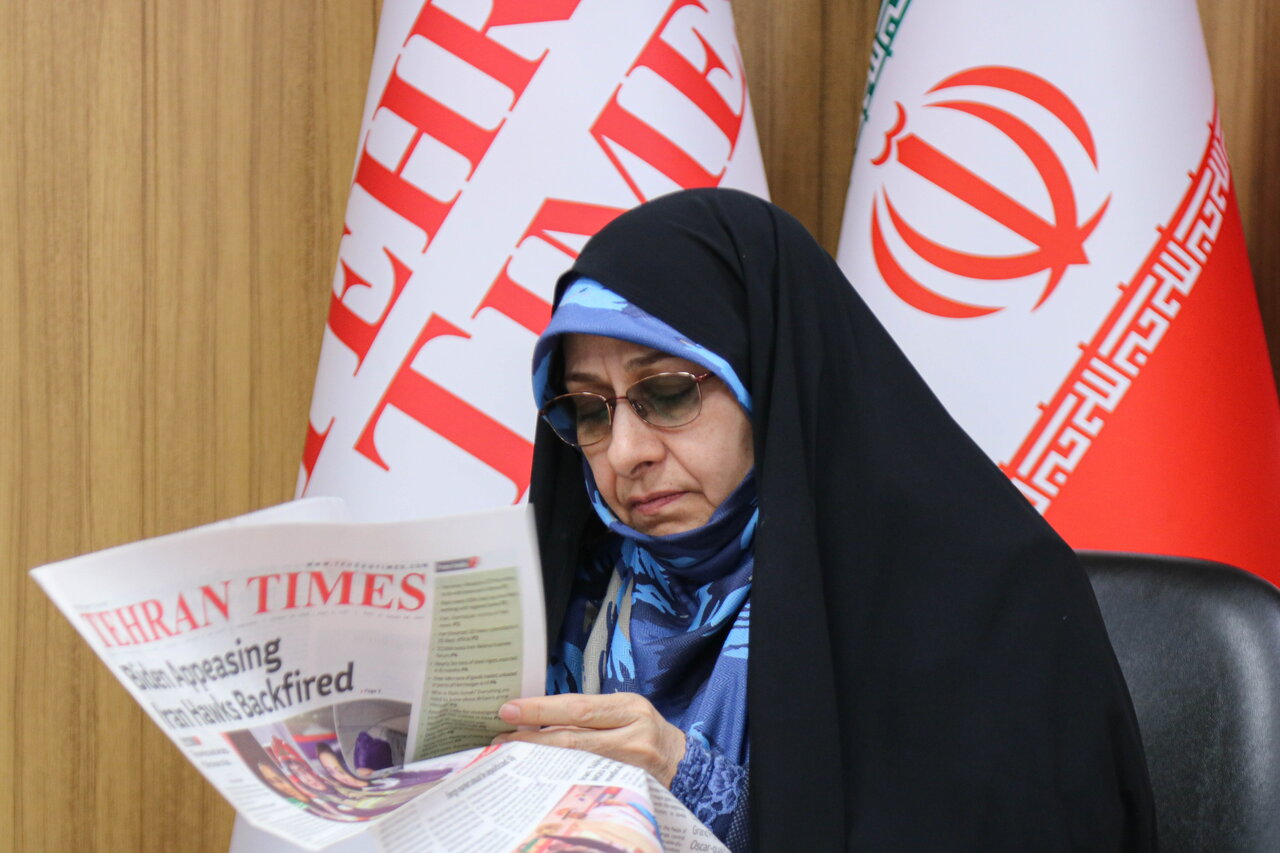By Fatemeh Khezri

TEHRAN- Ensieh Khazali, the vice president for women and family affairs, says western media's negative portrayal of Iranian women is vastly different from reality.
In an exclusive interview with the Tehran Times, Khazali expounded on the First International Congress for Women of Influence that was held in Tehran on January 20.
Female guests including wives of heads of state, ministers, vice presidents, and parliamentarians from Burkina Faso, Kyrgyzstan, Serbia, Guinea, Niger, Nigeria, Sri Lanka, Syria, Turkmenistan, and Armenia attended the congress.
In your opinion, what is the difference between the picture being painted by the western media about Iranian women and the reality?
We can say that the western media's portrayal of Iranian women is vastly different from reality.
Their portrayal of Iranian women is that of a deprived, under-pressure woman who has no effective activity, while Iranian women have contributed greatly to scientific, health, and environmental development as well as entrepreneurship.
In support of my words, foreign guests who attended the International Congress for Women of Influence said that what they were seeing here was totally different from what they had previously heard.
For instance, one guest from Japan said Iranian women were more advanced than Japanese women.
What are the plans of the Office of the Vice-President for Women and Family Affairs to introduce Iranian women to the world?
As part of our efforts, we use media and multimedia to introduce the elites. We also produce short films and promotional items about women who have made contributions to a variety of industries.
We are also trying to build a bridge between women in Iran and other countries while traveling, portraying the reality of Iranian women.
The First International Congress for Women of Influence was recently held. Could you tell us a little bit about the goals of this event and why it was organized?
The congress aimed to introduce Iran and the achievements of Iranian women, in particular.
It was also held to boost interaction with international women of influence, and finally, to establish economic links between Iran and other countries.
It is for sure that these activities will continue in social sectors, such as human rights, in order to help women who are underprivileged in certain countries.
This congress, for instance, decided to support Afghan women and allow them to continue their education in Iran.
What feedback did you get from the foreign guests?
Their first and most important concern was that this event was much needed and that it was held late and that the Islamic Republic of Iran should have done something like this earlier.
We were told by the guests that it would be great to see this type of activity would continue and that Iranian women's achievements would be introduced.
There are many accomplished women working abroad. How well-known is this group, and do you have any connections with them?
Some of them have been identified, but more needs to be done to support them and bring them to Iran for training and better development.
After the revolution, Iranian women have made tremendous progress and achievements in various fields. Please tell us why we have not been able to show progress to the world as decent as possible.
It is unfortunate that we are weak in terms of media coverage, and that the social and economic progress of women has not been properly reflected.
Before the Islamic revolution, the literacy rate was almost 30 percent among women. Now, the rate is nearly 95 percent. Life expectancy for women that was 56 years before the revolution is now 78 years as a result of the women's health program.
Furthermore, health insurance coverage for pregnant women and for infertility treatment is another achievement.
Although there are still some limitations, we see that Iranian women have attained great progress in the fields of arts, sports, and economics.
In a recent TV program, you said that the motto of "Woman, Life, and Freedom" is rooted in Islam and our revolution. Explain a little about this.
The Prophet of Islam revived women and honored them.
Imam Khomeini was also committed to encouraging women to come into society and make progress. Moreover, the Leader of the Islamic Revolution, Ayatollah Khamenei, has always stressed the importance of respecting housekeeping as an important responsibility.
Have you ever had a meeting with the Leader to give a report on women's issues? What feedback have you received from him?
Last year, we wrote a letter to the Leader, saying why only men and poets are invited on women's day, which is the birthday of Hazrat Zahra (SA) since this day is for women and they have the right to be invited.
The Leader's answer was “you are right”. This year, you saw that women were also invited to visit the Leader in a beautiful ceremony.

No comments:
Post a Comment